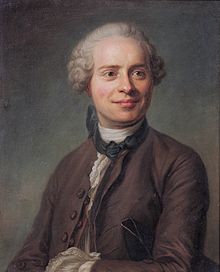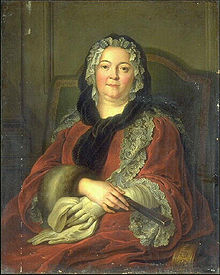
Jean le Rond D’Alembert (1717-1783) belonged to the group of scientists and philosophers, along with Rousseau, Diderot and Voltaire, who paved the way for the political changes that led to the French Revolution. D’Alembert, Rousseau and Diderot were responsible for the birth of the Encyclopédie; in particular, D’Alembert wrote many of the mathematical articles.

After his birth in Paris in November 1717, he was abandoned by his mother, the Baroness de Tencin, on the steps of the church of Saint-Jean-le-Rond in Paris, from which he took his name, and ended up in an orphanage. D’Alembert’s mother, who as a young woman was a nun, later had many important lovers, including a famous cardinal and the regent of France. In 1726 she was imprisoned in the Bastille and condemned to death for a false crime; thanks to the intervention of her brother, another cardinal, she was spared. D’Alembert’s father was a modest lover of the Baroness, the Chevalier Louis-Camus Destouches, although he showed more interest in the child, taking him from the orphanage and giving him up for adoption to Madame Rousseau, the wife of a glazier. Thanks to his father’s influence, the young D’Alembert was able to study at a prestigious Jansenist school, and when he died, he bequeathed him, without revealing his identity, a large sum of money.
When D’Alembert became famous, his mother, the baroness, tried to approach her son, but was rejected by him, who preferred to continue calling ”mother” to the adoptive one.
D’Alembert made important contributions in mechanics, astronomy and partial differential equations.

Leave a Reply